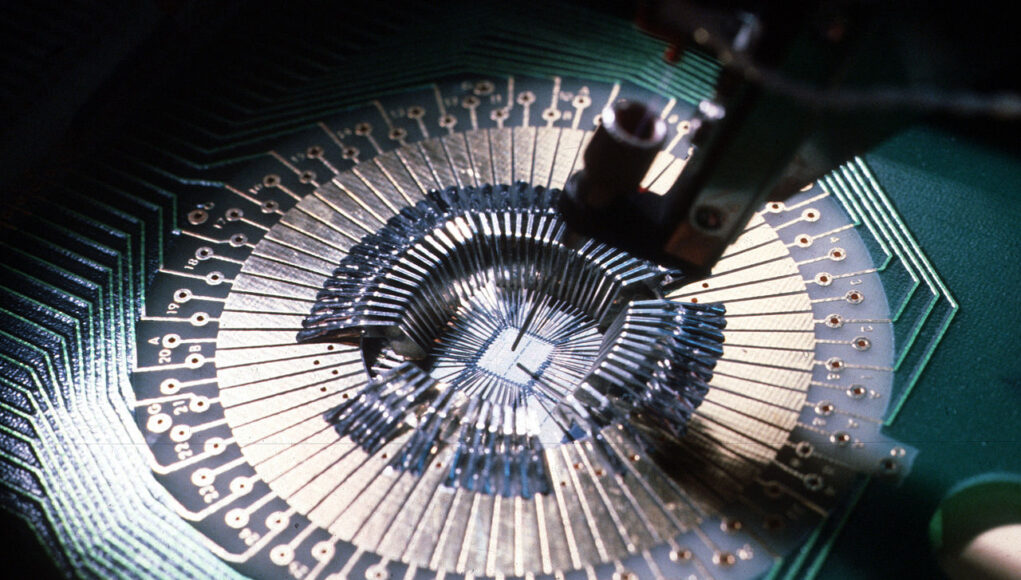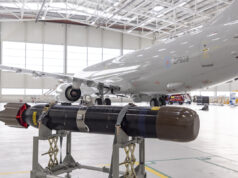A conflict between the US and China over computer chips – or semiconductors – has been escalating in recent months.
In particular, the US has taken steps to limit China’s access to advanced chip technology amid heightened international competition in the area.
The US recently tightened export controls to undercut China’s access to high-end chip manufacturing equipment and has banned top talent from working for Chinese semiconductor firms. Beijing retaliated by banning US chip maker Micron from operating in China.
This article was authored by Robyn Klingler-Vidra, Associate Dean, Global Engagement and Associate Professor in Entrepreneurship and Sustainability, King’s College London.
This article is the opinion of the author and not necessarily that of the UK Defence Journal. If you would like to submit your own article on this topic or any other, please see our submission guidelines.
Taiwan plays a critical role in this struggle. It has a huge share of the global semiconductor industry, but is also the focus of tensions between Beijing and Washington over its political status. For all practical purposes, Taiwan has been independent since 1949, but Beijing believes it should be reunited with the rest of China – possibly by force. In April 2023, China conducted extensive military drills near Taiwan, simulating an encirclement of the island.
So, what might happen to the chip industry were China to invade?
A US act passed in 1979 requires Washington to help defend Taiwan. Providing for the island’s security also fits with wider US objectives on technology and economic security. US politicians have not minced their words in affirming that a Chinese invasion would be met with a swift military response.
A Democratic congressman from Massachusetts, Seth Moulton, recently quipped that if China invades, “We’re going to blow up TSMC” – this being the acronym for Taiwan Semiconductor Manufacturing Company, the world’s most valuable semiconductor company. Congressman Moulton later clarified that he had been discussing several options for conveying the enormous costs of invading Taiwan to Beijing.
Because of Taiwan’s dominant position in the chip industry, its economy has been described as the the “most indispensable” in the world. And TSMC is the cornerstone of what’s been described as Taiwan’s “silicon shield” – the idea that an outsize global reliance on its microchips protects it from invasion by China.
Critical technology
The author Chris Miller tells the story of how Taiwan reached this dominant position in his book Chip War. It turns out to have been largely the result of strategic geopolitics and the individual leadership of several chip industry “godfathers”, including Morris Chang, the founder of TSMC.
Semiconductors are produced by a remarkably global supply chain, with design often stemming from US, Japanese or European firms, and manufacturing taking place in Taiwan and South Korea. However, Taiwan alone manufactures more than 60% of the world’s semiconductors -— and crucially, 90% of the most advanced ones.
There are fears the silicon shield might not hold forever, and an invasion by China would threaten the global economy with implosion. However, if TSMC were to build new manufacturing facilities elsewhere it would reduce the world’s reliance on Taiwan for chip production. A practice called “friendshoring” could concentrate manufacturing and the sourcing of materials outside Taiwan in countries friendly to the US. This would reduce risks to the US and its partners from an invasion.
However, such a shift would take years to complete and would be challenging to implement. In 2021, TSMC announced its plan to build a multi-billion-dollar facility in Arizona. But the plant will only be ready from 2025 at the earliest, and will probably not be capable of producing chips at what will by then be the technological frontier in terms of scale.
Generally speaking, the smaller the chip, the more transistors can fit on it. This enables the development of faster, more powerful electronic devices.
The Arizona facility is expected to produce chips at the 5 nanometre (nm) scale, and, at some stage, 3nm. This wouldn’t undermine Taiwan’s leadership, however, because TSMC is already working at 3nm in Taiwan and is likely to be further advanced by 2025.
TSMC may also face a challenge in attracting enough skilled employees to run its US operation.
The chip shortage
There is already a shortage of microchips, which began with the onset of COVID-19 in 2020 and has affected many industries and products. In 2021, global car production slumped 26% and consumer electronic product launches have been delayed largely as a result.
In a bid to boost chip supplies, the Biden administration and the EU have tried to improve supply chain resilience by incentivising production closer to home. The 2022 CHIPS and Science Act, for instance, offers more than US$50 billion (£40 billion) for semiconductor research and development, manufacturing and workforce development in the US.
Yet, these policies run counter to trade war tactics. Export controls and other downward pressures on global “friends” working with Chinese firms have meant that even when TSMC is at capacity, additional supply cannot come from Chinese manufacturers. Under current chip war conditions, low supply is likely to continue, which means price increases and product delays.
The military response to an invasion of Taiwan could see manufacturing of semiconductors on the island halted overnight. This would place marked pressure on the price of the chips manufactured outside Taiwan. The increase in chip prices would unleash massive inflation on a range of products and services, including cars, phones and healthcare equipment such as ultrasounds and vital sign monitors.
The reduction in semiconductor supply would also affect the very national security context that is shaping the contours of its production. A Taiwanese invasion would mean a halt to the availability of the advanced chips used in satellites, stealth jets, and supercomputers. China’s ambition of having a “fully modern” military by 2027, and its Made in China 2025 plan, to boost manufacturing, both hold semiconductor capabilities at the core.
Having access to TSMC know-how and supplies would be pivotal for delivering on these goals. But the US commitment to defending Taiwan – if it holds – would mean the destruction of TSMC facilities on the island. The world’s cutting-edge facilities for advanced chips would be decimated.
We should all care about a Chinese invasion of Taiwan. The global semiconductor industry would freeze. Inflation would spiral further upwards and the post-COVID recovery would be reversed. So many of the tools we rely on would disappear from our shops for years. It would wreak enormous damage on us all —- with the Taiwanese people bearing the greatest cost.
This article is republished from The Conversation under a Creative Commons license. Read the original article.














Life as modern people know it would become next to impossible if Taiwan loses its semi-conductor industry, we would see a global economic depression, the world has not seen for almost a century
You might of thought that someone in authority might have seen this coming past 20 years little old me was spelling out the scenario probably from the late 90s, fact is short term desire for profit and access to cheap products and the political advantage in that at home and in this country the distaste for the unions has led to much heads in sands hoping it won’t come to pass. And then you get a particularly nationalist anti western Chinese leader getting towards a point of not relying on Western markets and hey no the perfect storm and all that short term selling out of our industry and means to produce anything comes back to hahaunt us on masse. Talk about reap what you have sown how the hell did the Americans allow 90% of the world’s top end chips based ironically on western technology come to rest in a place that China was always going to get back eventually. Sadly they listened to Intels pr campaign in Congress for far too long and hadn’t noticed how irrelevant they were becoming on the World stage.
Its actually far more to do with the original policy that the US democrats had (Clinton). The thoughts were, allowing China to develop a middle class the idea was there would be political change that accompanied that development and democratic country would emerge and Taiwan’s own democracy would be respected. The Republicans, that most would associate with going after profits, by in large opposed the opening up of China.
There’s not distaste for unions in the west, in Germany the union leaders are well educated in business, not politically aligned and sit on the board for example. Not to sure some of our unions bosses could read or understand a P&L report and offer some tangible input to a board meeting 🙂
If the semi-conductor is what China wants they’d be stupid to destroy it. Maybe it’s more of a strategic denial tactic against the West, same that’s being done to Russia and to some degree China now.
The West needs to have some production capacity brought back into its own neighbourhood or spread over other friendly countries, like South Korea,Japan, India and even the US, Europe and the UK, even if some is more niche production.
A war over Taiwan will likely affect the China mainland and so its population big time. And who says Taiwan will be a push-over. The CCP may want war but does the Chinese population, even their diaspora around the world? It could all backfire on them.
Good article I have been trying to get this through to people for years but as usual everyone thinks life will just go on as usual, it’s so naive. To expect them to understand the link between Ukraine and that potential disaster is even further from their consciousness. This was supposed to be a rehearsal sort of setting up the pieces and Russia saw an easy way for it to gain access if at the behest of China to all the technology that the West would/ will be deprived of. We would be a total sitting duck and yet even politicians refuse to acknowledge the full implications, or if they do they aren’t making it public and meantime trying to win the next election takes priority, even though future elections would become all but meaningless if that scenario comes to fruition.
Thankfully TSMC is investing in Germany and India as well as Arizona so things may eventually improve but an invasion will mean their Taiwznese facilities will indeed need to be totally destroyed, it runs in many respects ton US and European design technology which is why it’s so important to China because it limits their options. But as mentioned the Companies most advanced tech is likely to remain there and you can bet their European output will become EU only in such a catastrophe as US production would remain with them. It’s the only reason that the US Govt is keeping Intel alive because despite the mediocrity of its chips and decline share it has some of the best fab IP and infrastructure around its just not using it for what the World increasing needs and that’s Arm and other Risc based chips.
It will be ironic that the original and indeed still much of the design for these chips originated here and still done here and yet we will likely be the worst placed Western Country to be able to access them in any shortage in supply (probably mildly true of the present one indeed) let alone a catastrophic future one that’s becoming more likely by the month.
Big businesses do not care about national security.
By moving manufacturing plants to the east they have put many countries at risk should hostilities break out between China and Taiwan.
Not to mention the local jobs and wealth lost by offshoring.
Having some national capacity/capability to produce essential components should be the goal of Western countries.
Unfortunately, what this does is put the west and china on a collision course for WW3. This may go down in history as one of the worst and most obvious geopolitical blunders in history…also Taiwan creates this entanglement purposefully, it was a purposeful geopolitical strategy…and you may say but we have to defend democracy…Taiwan was still effectively a military dictatorship in 1979 when they US decided they had to defend Taiwan…also it’s still the government of Taiwan’s aim to reunify china under one government ( the ROC), just as it’s the PRC to reunify Taiwan. You have to remember there was never an actual end to the Chinese civil war both sides could simply not get to each other across the strait. Not saying it would not be wrong to defend Taiwan..but the west put itself in a position to have to defend Taiwan….that’s a stupid move geopolitically.
The other big problem is This is totemic issue for china and they are never going to back away from this. China is not waking up one day ans going OK ROC keep Tiawan we don’t want it any more. For the west a more sensible and pragmatic approach would have been to leave well alone. Getting involved in other people’s civil wars is fools game, I’m not sure what it is when you then allow a critical manufacturing resource that is completely critical to up your economy to be built in the middle of that civil war…add in the fact the side you are going to be forced to go to war with is a nuclear power….very foolish.
Yes, Taiwan went down this path on purpose. They have next to no resources other than their people. No different to South Korea, Japan or Singapore. They all have a highly educated population & not much else. In the modern world, high tech is really their only option.
Whose bright idea was it to transfer the West’s means of production to Communist China and its neighbouring countries over the last 30-40 years.
Well it was the market, the market alway goes with the cheapest realistic option. It’s the weakness in the end of neoliberalism, it can be manipulated by a mercantile strategy.